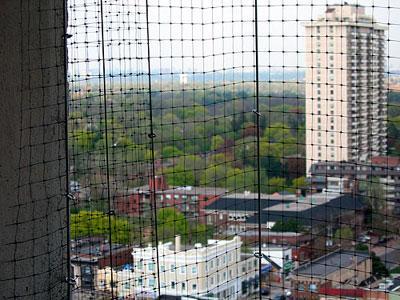Hawkeye Bird Control Inc. uses two types of netting to stop birds, such as pigeons, gulls, sparrows, and starlings, from nesting on, or occupying balconies. The netting is available in:
STANDARD WEIGHT
(Two year warranty), plastic with a heavy UV coat. Square ¾ inch to 4 inch holes to keep birds out;
HEAVY-DUTY WEIGHT
(Five year warranty) each hole individually knotted and heat set with an extreme coat of UV & water/ice protection. This netting is more suited for unit owners and/or long term use. A huge advantage of the heavy duty weight netting is its upside down large U-shaped zipper (exclusive to Hawkeye; we started this in the late 80’s), which can be installed at an additional cost. It enables the user to roll up the flap on the net when requiring full usage of the balcony.
ON BOTH STYLES OF NETTING:
Visibility
Slightly reduced, but it is very easy to focus through the nets.
Method
After cleaning and depending on the size of the balcony, very little hardware is needed. Installation requires attaching a galvanized (rust inhibited) steel cable to the structure, as well as to the net. Installation can be done from the banister, or the floor, depending on the size of the holes (within the banister).
INFORMATION REQUIRED WHEN CALLING FOR A QUOTE:
- Please have length, width, and height measurements from floor and banister in feet available.
- The extent of dirt and/or damage; in other words, how long would it take you to clean, if you ever dared to.
- Do you have any bulky or heavy or a large volume of items on your balcony? Most balconies from start to finish should not require more than 2 hours to clean and then install the netting. Any more time than this will impact pricing.
- Your full address and phone number in front of you.
- Your payment option: We accept credit cards, Paypal, or company cheques (sorry, no personal cheques).

















